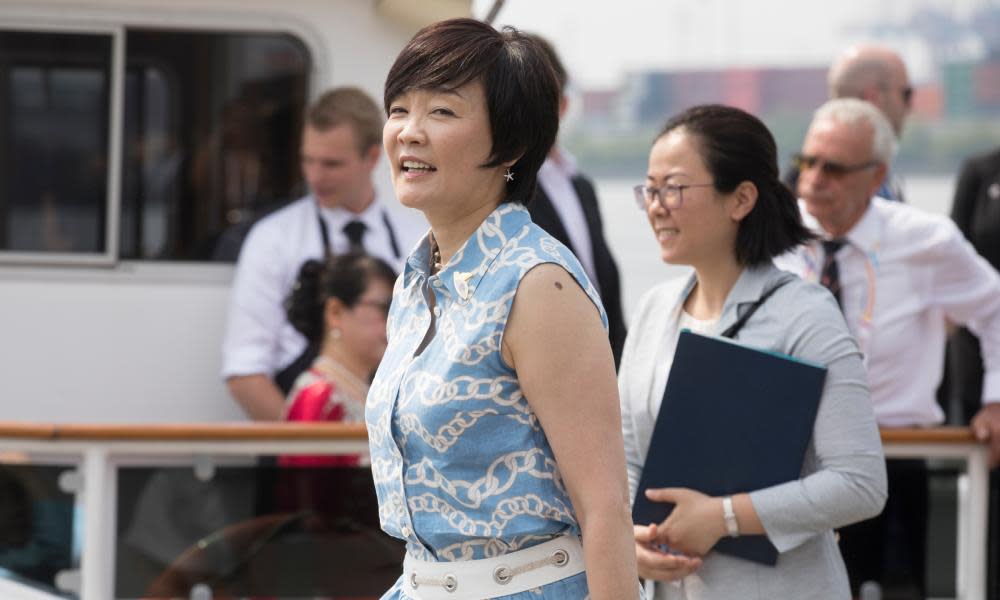Is this the ‘nasty’ women’s fightback against Trump we’ve been waiting for? | Fiona Sturges

There are all manner of reasons why a woman,upon finding herself in the same room as Donald Trump, might wish to give him the swerve. There’s his propensity to condescend and talk over her; to rate her in terms of appearance; to publicly wonder whether she is menstruating; or, as he famously boasted in 2005, to simply “grab [her] by the pussy”. And that’s before she gets to his views on childcare, workplace equality and abortion. But how many of us, faced with the actual president of the United States, his tiny hand outstretched, would have the nerve to blank him?
By now possibly quite a few, given the recent actions of assorted first ladies. When, earlier this month, Akie Abe, wife of the Japanese prime minister, Shinzo Abe, sat next to the US president at the final dinner of the G20 summit, she didn’t try to engage him in conversation. In an interview with the New York Times, Trump attributed her silence to her inability to speak English. Yet shortly afterwards, a video surfaced on social media of Abe delivering a 15-minute address at a New York climate symposium in English, prompting speculation that the language problem was in fact a clever ruse to avoid talking to him.
Whatever the veracity of this claim, Abe wouldn’t be the first woman to have given Trump the cold shoulder. During his visit to Warsaw, handily captured on film, Poland’s first lady, Agata Kornhauser-Duda, appeared to ignore his attempt at a handshake, moving straight past him to take his wife Melania’s hand instead. The American first lady has herself been caught twice on camera avoiding her husband’s hand – on one occasion, in Tel Aviv, very clearly batting it away. But perhaps the most inspired example of Donald-dodging was Hillary Clinton’s rehearsal ahead of the presidential debates last year where, as seen on a video posted online, she practised ducking the Trump hug, using her senior adviser Philippe Reines as a stand-in.
Of course, for every woman that finds a smart way to keep her distance from Trump, there will be many more who will shake his hand and endure his oleaginous smalltalk without complaint. Certainly, French first lady Brigitte Macron seemed to take one for the team during Trump’s state visit when he told her, and then her husband, that she was in “great physical shape”. And compared to the explicit Trump-trolling by, say, actor Alec Baldwin on Saturday Night Live, or by Kim Jong-un as he proudly parades his nukes, these are subtle slights against a Teflon president who, for the most part, regards battling his detractors as a sport.
But the notion of first ladies if not publicly stating their contempt then not quite hiding it either is something new that both goes against what we have been taught to expect from leaders’ wives and from women in general. For decades, the female spouses of presidents and prime ministers have assumed the role of the corporate wife: smiling at all times and being a fabulous host. At diplomatic events in particular, she is there to provide a warm welcome, to oil the wheels of conversation and support her husband, all the while keeping her opinions to herself.
While in everyday life most of us aren’t required to don a cocktail dress on a weeknight to entertain visiting presidents, there’s still an unspoken expectation for women, particularly in business situations, to act as social lubricant, to keep their male colleagues happy and to work uncomplainingly in proximity to the type of creeps whom, in another situation, they would happily deflect with a can of pepper spray.
One of the positive byproducts of the current US administration is the groundswell of female resistance that has sprung up against Trump and his values, as shown in the huge women’s marches across the US and beyond the day after his inauguration. Such shows of solidarity and power are significant in the ongoing battle against misogyny. But these smaller acts of defiance – whether a handshake ignored or a conversation avoided – are significant too, performed as they are by women on the world stage. Such snubs are not the actions of mutely servile political wives but sentient, ideologically engaged women who are making their feelings known in the best way that they can. These are the hallmarks of Trump’s “nasty” women. Long may they leave him hanging.

 Yahoo News
Yahoo News 
